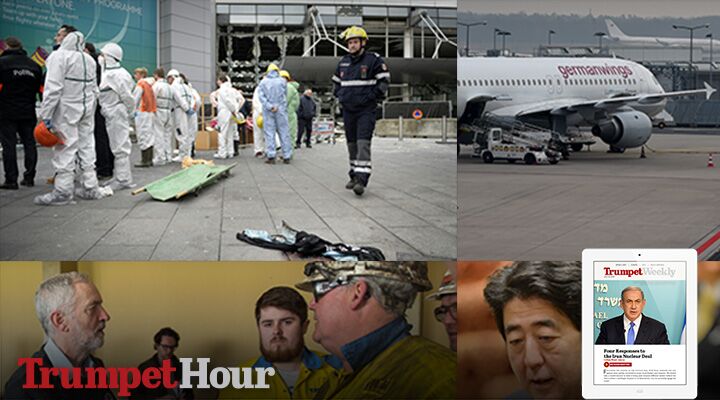Get all the important news from March 26-April 1 by downloading the Trumpet Weekly.Click here to receive it by e-mail every week.
Highlights:
Islamic State in Europe
Jihadists from the Islamic State are proving more pervasive and more menacingly ambitious than was previously realized.Reports say the target of the recent bomb attack in Brussels, Belgium, was originally intended to be a nuclear site.The terrorists possessed video footage of a leading official at a Belgian nuclear power plant. Two days after that attack in Brussels, a security officer for a Belgian nuclear site was killed. His security access badge was stolen in the incident.But it’s not just nuclear power plants that Islamists would like to attack. Reports indicate they are also eyeing American nuclear weapons at various bases in Belgium and other European nations.“Washington’s traditional nuclear strategy isn’t keeping Europe safe,” Foreign Policy’s Jeffrey Lewis warned. “It’s putting everyone at risk of apocalyptic terrorism.”Germany: Next on the Islamic State’s hit list
The Islamic State called on German Muslims to execute Brussels-style attacks on Chancellor Angela Merkel’s offices and the Cologne-Bonn airport.“Germany is a battlefield,” the militants said. “What your brothers in Belgium were able to do, you can do too.”“It is clear that Germany is the focus of international terrorism and that attacks could happen,” said a spokeswoman of Germany’s bka federal police. But former German Defense Minister Karl-Theodor zu Guttenberg condemned Europe’s leadership for not acting decisively enough against radical Islam. The more Europe (and especially Germany) is a focus of Islamic terrorism, the closer it gets to fighting back.Turkey turns to Lebanon
“[I]n its efforts to destabilize Assad,” wrote the Jerusalem Center for Public Affairs (jcpa), “Turkey may have chosen to take advantage of the already boiling situation in Lebanon between Hezbollah and its Sunni opponents and try to provoke a renewed civil war in Lebanon.”If intense conflict erupts in Lebanon, noted the jcpa, Hezbollah will likely withdraw support from Syrian dictator Bashar Assad, leaving him more vulnerable.Such an outcome would endanger Israel, threaten Syria, and lead to the congealing of the Middle Eastern alliances prophesied in the Bible.Britain losing its steel—literally
Britain is reportedly sacrificing its steel production for the sake of cheap steel from China and a nuclear plant deal with Beijing.“Britain’s special relationship with China is becoming more expensive by the day,” wrote the Telegraph’s Ambrose Evans-Pritchard. “It now threatens to destroy the British steel industry, a foundation pillar of our manufacturing economy.”As Britain is de-industrializing, China is re-industrializing and, by extension, remilitarizing. China leads the world in the production of steel—one of the most important war-making materials on the Earth.Evans-Pritchard called this development “civilizational suicide.”China responds to Japan ‘threats’
After Japan passed controversial laws that allow its soldiers to fight on foreign soil for the first time since World War ii, China accused Japanese Prime Minister Shinzo Abe of threatening peace in the Pacific region.Referring to the Japanese leader as a “warlord,” China’s state-run Xinhua news agency warned: “Let the future annals of Japan’s history not read that it was foolish enough to allow history to repeat itself, as history has already confirmed that such echoes of aggression will likely not end well for Japan.”Other news:
Evidence of China’s authoritarian tendencies continues to mount, as 16 workers at a news outlet that criticized the president all disappeared.Nearly half of Germans want former Defense Minister Karl-Theodor zu Guttenberg to return to politics, and many of those want him to take the chancellorship. In a recent Handelsblatt interview, Guttenberg warned that the rise of populists in Europe and America “will lead us to question whether our beloved, and so important, and still growing, democratic system is as stable as we would like it to be, or whether we need to look at it from a new creative point of view.”Standard and Poor’s average rating on United States corporate debt just sagged to almost a 15-year low.Get more details on these stories and more by subscribing to the Trumpet Weekly!

